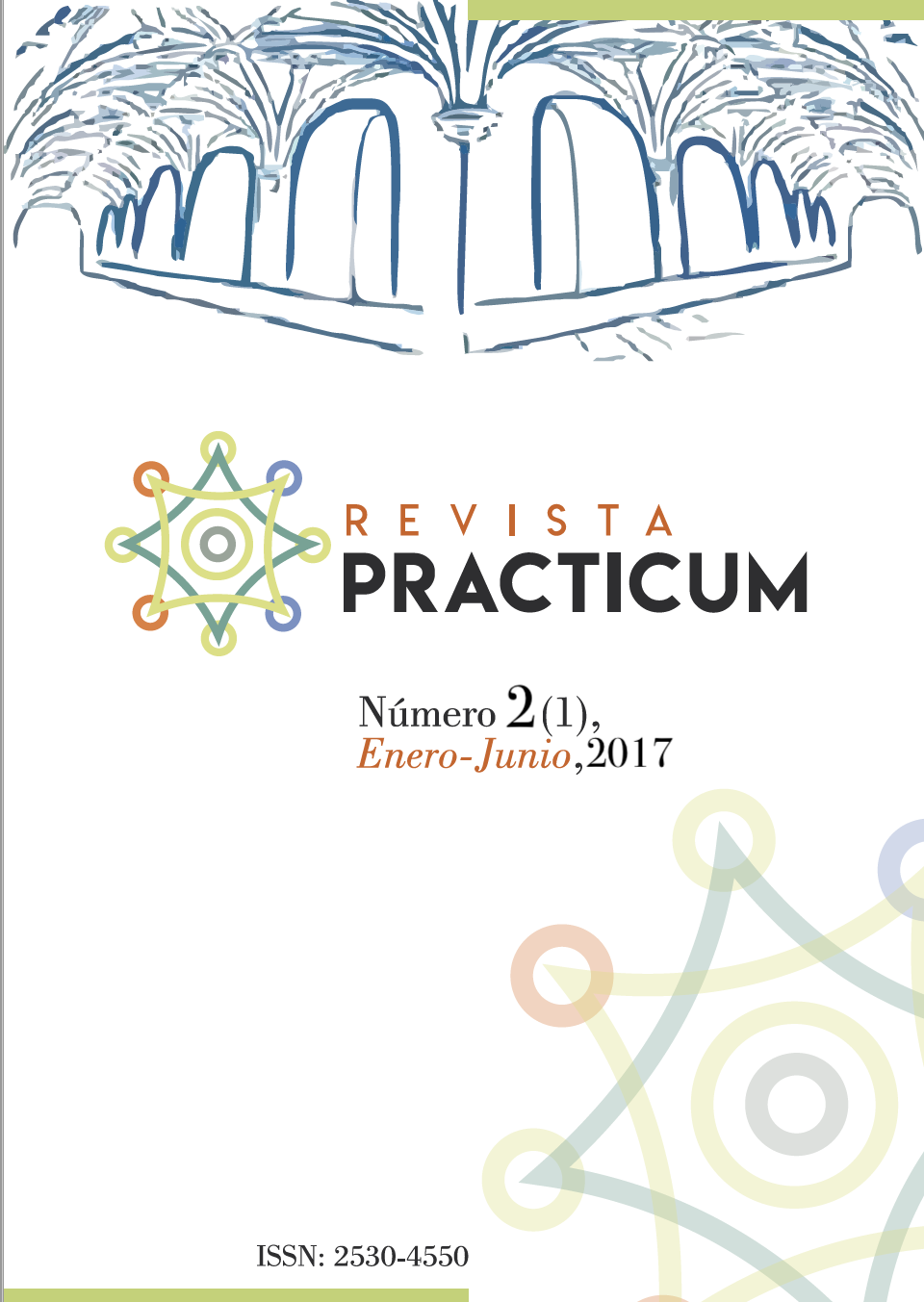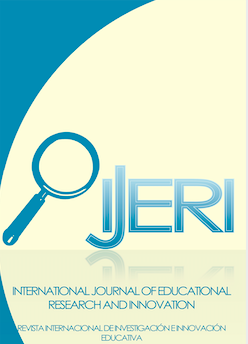Study of the communication in the evaluation of the diaries of practices that improvethe argumentation
DOI:
https://doi.org/10.24310/RevPracticumrep.v2i1.8262Keywords:
Reflective daily; digital rubric; self-assessment, peer-assessment and argumentationAbstract
Nothing better to establish an integrated learning between faculty knowledge and external practices, than the methodology of the reflective daily where students reflect and argue about their experiences and learnings.Although these journals are a common practice in most institutions, they are not always done in a dialogical and permanent way with university tutors, much less among the same students distributed in different centers, thus limiting many of the benefits that result from sharing experiences, moreover, sharing the assessment themselves. The study with qualitative design aims to analyze the results of the conversations between tutor and student at the time of the assessment, and the impact of this methodologyto guide and assessment the reflection and the argumentation about the practice. We analyzed 192 daily students, and the 128 annotations that generated from qualitative analysis with "Q-analysis" techniques. From the most relevant conclusions we find thatthe changes in argumentation improvement during the fourteen weeks are clearly observed. At the same time, a rubric methodology is presented as the content of the same for the monitoring and assessment of reflective daily with criteria of argumentation.
Downloads
Metrics
Publication Facts
Reviewer profiles N/A
Author statements
Indexed in
-
—
- Academic society
- N/A
- Publisher
- Universidad de Málaga
References
Bartolomé, A., Cantón, I. C. & Ferrer, J. M. M. (2017). Una revisión a los Practicum de Educación desde las tecnologías. Revista Prácticum, 1(1).
Bartolomé, A., Martínez-Figueira, E., &Tellado-González, F. (2014). La evaluación del aprendizaje en red mediante blogs y rúbricas: ¿complementos o suplementos? REDU.Revista De Docencia Universitaria, 12(1), 159-176.
Barreto, H. (2009). Conferencia inaugural. Jornadas Internacionales"Docencia, investigación e innovación en la universidad. Trabajar con ePortfolios".Universidad de Santiago de Compostela (España) 23-24 nov.
Baker, D. L. (2011). Designing and orchestrating online discussions. Journal of Online Learning and Teaching, 7(3), 401-411.
Buendía Eisman, L., Colás Bravo, P., & Hernández Pina, F. (1998). Métodos de investigación en psicopedagogía. Madrid: McGraw-Hill.
Cebrián-de-la-Serna, M.; Serrano-Angulo, J. &Ruiz-Torres, M. (2014). Las eRúbricas en la evaluación cooperativa del aprendizaje en la Universidad. Comunicar, 43.153-161.https://doi.org/10.3916/C43-2014-15.
Cebrián-de-la-Serna, M. & Bergman, M. (2014). Evaluación formativa con e-rúbrica: aproximaciónal estado del arte. REDU. Revista de docencia universitaria. V 12(1) 15-22. https://doi.org/10.4995/redu.2014.6427
Cebrián Robles, D., Serrano Angulo, J., & Cebrián de la Serna, M. (2014). Federated eRubric service to facilitate self-regulated learning in the european university model. European Educational Research Journal, 13(5), 575-583. doi:10.2304/eerj.2014.13.5.575
Cebrián de la Serna, M. (2014). El ePortafolio de evidencias y la evaluación formativa con eRúbricas. Revista EmRede, 1(1), 7-20.
Cebriánde la Serna, M. (2011). Supervisión con ePortafolios y su impacto en las reflexiones de los estudiantes en el Practicum. Estudio de Caso. Revista de Educación, nº 354,Enero. pp.183-208.
Cetin, P. S., Dogan, N., & Kutluca, A. Y. (2014). The Quality of Pre-service Science Teachers’ Argumentation: Influence of Content Knowledge. Journal of Science Teacher Education, 25(3), 309-331.
Fernández Díaz, E., & Adelina Calvo, s. (2012). La formación permanente del profesorado en el uso innovador de las TIC. Una investigación-acción en infantil y primaria. Profesorado. Revista de currículum y formación de profesorado, 16(2), 355-370.
Gallego-Arrufat, M.J., & Raposo-Rivas, M. (2014). Compromiso del estudiante y percepción del proceso evaluador basado en rúbricas. REDU.Revista De Docencia Universitaria, 12(1), 197-215.
Iordanou, K., & Constantinou, C. P. (2014). Developing pre-service teachers' evidence-based argumentation skills on socio-scientific issues. Learning and Instruction, 34,42-57. http://doi.org/10.1016/j.learninstruc.2014.07.004
Jenson, J. D. (2011). Promoting self-regulation and critical reflection through writing students’ use of electronic portfolio. International Journal of ePortfolio, 1(1), 49-60.
Kim, S. H. (2013). The Effects of Reflection Rubric on Critical Thinking and Collaboration Argumentation in CSCA environment. Journal of the Korea Academia-Industrial cooperation Society, 14(11), 5559-5569.
Klenowski, V. (2004). Desarrollo del portafolios para el aprendizaje y la evaluación: Procesos y principios. Madrid: Narcea Ediciones.
Kuhn, D. (2010). Teaching and learning science as argument. Science Education, 94(5), 810-824. doi:10.1002/sce.20395
Lawson, T., Çakmak, M., Gündüz, M., &Busher, H. (2015). Research on teaching practicum –a systematic review. European Journal of Teacher Education, 38(3), 392-407. doi:10.1080/02619768.2014.994060
Liu, F., & Stapleton, P. (2014). Counter argumentation and the cultivation of critical thinking in argumentative writing: Investigating washback from a high-stakes test. System, 45, 117-128.
Marcolino, T. Q., & Reali, A. M. (2010). Análisis de los feedbacks de diarios reflexivos a lo largo de un proceso de mentoría en grupo. Revista Iberoamericana de Educación, (52)6. https://goo.gl/JvXGh6
Martínez-Figueira, E., Tellado-González, F., & Raposo-Rivas, M. (2013). La rúbrica como instrumento para la autoevaluación: Un estudio piloto. REDU. Revista De Docencia Universitaria, 11(2), 373-390
Monedero-Moya, JJ.; Cebrián-Robles, D. y Cebrián-de-la-Serna, M. (2015). Documentando el eportafolios federado con evidencias multimedia, anotaciones de video y erúbricas. XIII Symposium Internacional sobre el Practicum y las Prácticas Externas. 29Jun-1Jul 2015. Poio. Pontevedra. https://goo.gl/UOiyt8
Nussbaum, E. M., Sinatra, G. M., & Poliquin, A. (2008). Role of epistemic beliefs and scientific argumentation in science learning. International Journal of Science Education, 30(15), 1977-1999. doi:10.1080/09500690701545919
Özçinar, H. (2015). Scaffolding computer-mediated discussion to enhance moral reasoning and argumentation quality in pre-service teachers. Journal of Moral Education, 44(2), 232-20. doi:10.1080/03057240.2015.1043875
Pérez Galán, R., Cebrián Robles, D. & Rueda Galiano, A.B. (2014). Evaluación de pares y autoevaluación con erúbricas: caso de estudio en el grado de Educación Primaria. REDU -Revista de Docencia Universitaria,12(4), 337-456. Recuperado de http://www.red-u.net
Pérez-Torregrosa, A.B., Gallego-Arrufat, M.J., & Gámiz-Sánchez, V.M (2016). Self Assessment with Electronic Rubrics of Undergraduates in the Practicum in Spain and Greece. Paper presented at the ECER 2016, Leading Education: The Distinct Contributions of Educational Research and Researchers. European Educational Research Association, EERA.
Raposo-Rivas, M.,Cebrián-de-la-Serna, M.,&Martínez-Figueira, S. (2013). The electronic rubric to value skills on ICT subjects. European Educational Research Journal. (13)5, 584-594. https://doi.org/10.2304/eerj.2014.13.5.584
Tejada Fernández, J. (2005). El trabajo por competencias en el prácticum: Cómo organizarlo y cómo evaluarlo. Revista Electrónica De Investigación Educativa, 7(2), Recuperado de https://goo.gl/45eRbi
Toom, A., Husu, J., & Patrikainen, S. (2015). Student teachers’ patterns of reflection inthe context of teaching practice.European Journal of Teacher Education, 38(3), 320-340. doi:10.1080/02619768.2014.943731
Zabalza-Beraza, M. (2017). El Practicum y las prácticas externas en la formación universitaria. Revista Prácticum, 1(1). https://goo.gl/4I7h55
Zabalza-Beraza, M. A. (2013). El practicum y las prácticas en empresas en la formación universitaria.Madrid: Narcea Ediciones.
Zabalza-Beraza, M. A. (2004). Diarios de clase: Un instrumento de investigación y desarrollo profesional.Madrid: Narcea Ediciones.
Zeichner, K., & Wray, S. (2001). The teaching portfolio in US teacher education programs: What we know and what we need to know. Teaching and Teacher Education, 17(5), 613-621. doi:10.1016/S0742-051X(01)00017-8
Downloads
Published
How to Cite
Issue
Section
License
Acceptance of the work implies that the author grants Revista Prácticum the exclusive rights to reproduce, distribute and sell his or her work worldwide, both in digital and paper formats, CD-ROM, etc.
Likewise, the authors shall grant Revista Prácticum the rights of dissemination, public communication on the Internet and IT networks, data buses, as well as any other portals or electronic devices for online consultation of its contents and extracts, under the conditions of the portal, repositories or databases where the work is stored.
Revista Prácticum allows authors to publish and disseminate their articles and works on their personal websites, research teams, institutional repositories and scientific databases. All this in accordance with the Creative Commons 4.0 License










8.png)








